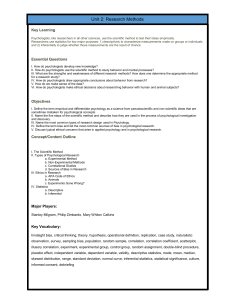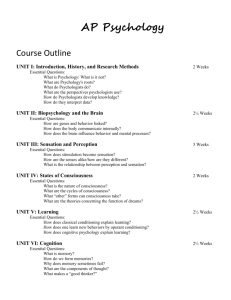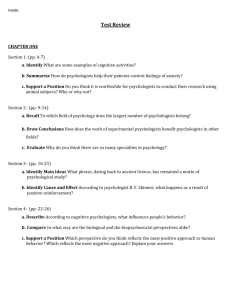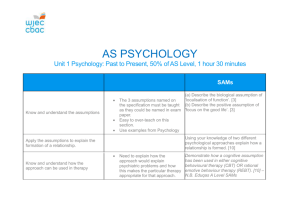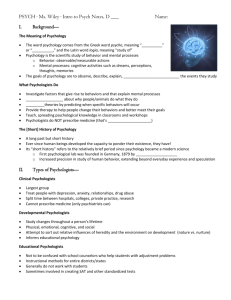MEd/EdS program in School Psychology
advertisement
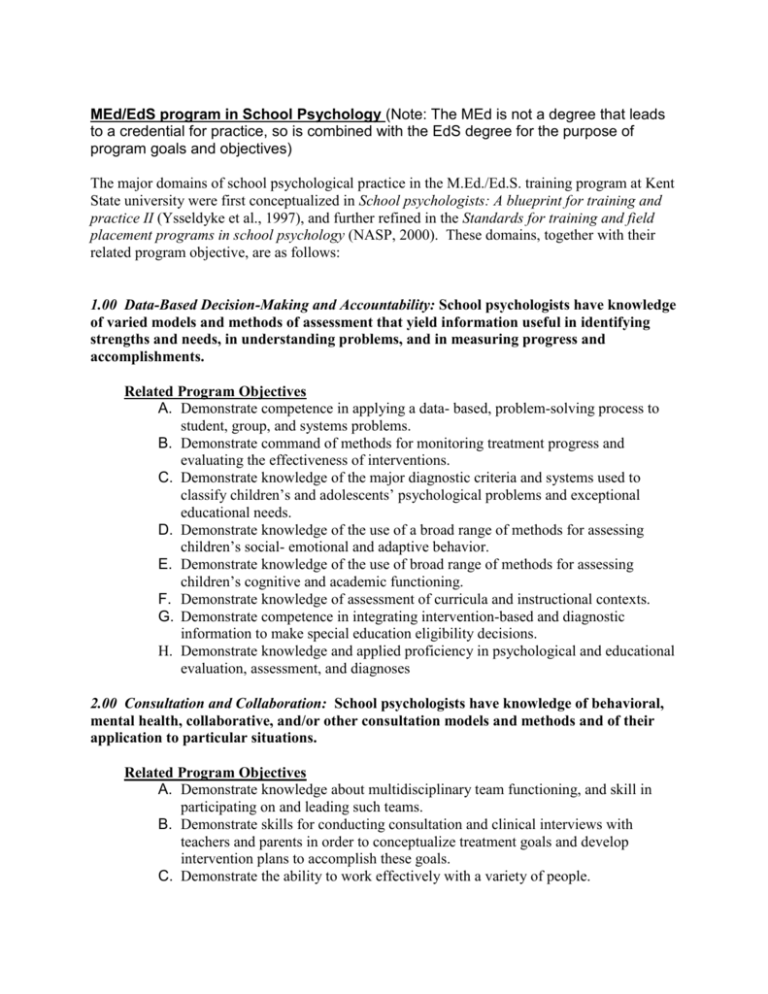
MEd/EdS program in School Psychology (Note: The MEd is not a degree that leads to a credential for practice, so is combined with the EdS degree for the purpose of program goals and objectives) The major domains of school psychological practice in the M.Ed./Ed.S. training program at Kent State university were first conceptualized in School psychologists: A blueprint for training and practice II (Ysseldyke et al., 1997), and further refined in the Standards for training and field placement programs in school psychology (NASP, 2000). These domains, together with their related program objective, are as follows: 1.00 Data-Based Decision-Making and Accountability: School psychologists have knowledge of varied models and methods of assessment that yield information useful in identifying strengths and needs, in understanding problems, and in measuring progress and accomplishments. Related Program Objectives A. Demonstrate competence in applying a data- based, problem-solving process to student, group, and systems problems. B. Demonstrate command of methods for monitoring treatment progress and evaluating the effectiveness of interventions. C. Demonstrate knowledge of the major diagnostic criteria and systems used to classify children’s and adolescents’ psychological problems and exceptional educational needs. D. Demonstrate knowledge of the use of a broad range of methods for assessing children’s social- emotional and adaptive behavior. E. Demonstrate knowledge of the use of broad range of methods for assessing children’s cognitive and academic functioning. F. Demonstrate knowledge of assessment of curricula and instructional contexts. G. Demonstrate competence in integrating intervention-based and diagnostic information to make special education eligibility decisions. H. Demonstrate knowledge and applied proficiency in psychological and educational evaluation, assessment, and diagnoses 2.00 Consultation and Collaboration: School psychologists have knowledge of behavioral, mental health, collaborative, and/or other consultation models and methods and of their application to particular situations. Related Program Objectives A. Demonstrate knowledge about multidisciplinary team functioning, and skill in participating on and leading such teams. B. Demonstrate skills for conducting consultation and clinical interviews with teachers and parents in order to conceptualize treatment goals and develop intervention plans to accomplish these goals. C. Demonstrate the ability to work effectively with a variety of people. D. Summarize and communicate results of student evaluations and reports of research in terms that are understandable to educators and parents. E. Demonstrate command of effective writing and speaking methods for communicating with educators, parents, and fellow professionals. F. Demonstrate knowledge of networks of child care systems and skill in interacting with diverse systems. G. Demonstrate knowledge of fundamental principles related to leading and managing change. 3.00 Effective Instruction and Development of Cognitive/Academic Skills: School psychologists have knowledge of human learning processes, techniques to assess these processes, and direct and indirect services applicable to the development of cognitive and academic skills. Related Program Objectives A. Demonstrate knowledge of educational foundations, including special instructional, remedial and applied behavioral techniques. B. Demonstrate understanding of the theoretical, as well as procedural, similarities and differences of various approaches to conceptualizing academic and cognitive problems. C. Demonstrate knowledge of standard curricular and instructional foundations. D. Demonstrate knowledge of major learner- generated strategies or activities that enhance cognitive and academic performance. E. Demonstrate knowledge of the efficacy of empirically supported treatments that facilitate the cognitive and academic development of all children. F. Conceptualize treatment goals and develop intervention plans to accomplish these goals. G. Demonstrate command of methods for monitoring treatment progress and evaluating the effectiveness of interventions. 4.00 Socialization and Development of Life Skills: School psychologists have knowledge of human developmental processes, techniques to assess these procedures, and direct and indirect services applicable to the development of behavioral, affective, adaptive, and social skills. Related Program Objectives A. Demonstrate understanding of the theoretical, as well as procedural, similarities and differences of various approaches to conceptualizing problems in socialemotional and adaptive functioning. B. Demonstrate knowledge and skill in implementing individual counseling and behavioral interventions for children and youth. C. Demonstrate knowledge and skill in implementing group counseling and behavioral intervention for children and youth. D. Demonstrate knowledge of school psychological service delivery systems and evidence based interventions that facilitate the social-emotional and adaptive functioning of all students. E. Conceptualize treatment goals and develop intervention plans to accomplish these goals. F. Demonstrate command of methods for monitoring treatment progress and evaluating the effectiveness of interventions. 5.00 Student Diversity in Development and Learning: School psychologists have knowledge of individual differences, abilities, and disabilities and of the potential influence of biological, social, cultural, ethnic, experiential, socioeconomic, gender-related, and linguistic factors in development and learning. Related Program Objectives A. Demonstrate the ability to work effectively with a variety of people. B. Demonstrate knowledge about, sensitivity to, respect for and responsiveness to children, youth, and families from various cultural and racial backgrounds. C. Demonstrate knowledge and appreciation for diversity and disabilities. D. Demonstrate knowledge of effective teaching methods and how such methods can be used to affect the learning and behavior of a diverse population of students. 6.00 School and Systems Organization, Policy Development, and Climate: School psychologists have knowledge of general education, special education, and other educational and related services. Related Program Objectives A. Demonstrate knowledge of the organization and operation of schools, including directed observations and participation in school settings. B. Demonstrate knowledge of systems variables that promote positive learning and behavior of all students. C. Demonstrate knowledge of social and political forces affecting public schools. D. Demonstrate knowledge of organizational change strategies. 7.00 Prevention, Crisis Intervention, and Mental Health: School psychologists have knowledge of human development and psychopathology and of associated biological, cultural, and social influences on human behavior. Related Program Objectives A. Demonstrate knowledge of psychological foundations focused on both typical and exceptional human learning and development, including biological and social bases of behavior. B. Demonstrate knowledge and applied proficiency in psychological and educational intervention strategies including counseling, consultation, and behavior management. C. Demonstrate knowledge and applied proficiency in prevention and intervention models to promote wellness. D. Demonstrate knowledge of school psychological service delivery systems that facilitate the learning and behavior of all students, including both proactive and reactive strategies. 8.00 Home/School/Community Collaboration: School psychologists have knowledge of family systems, including family strengths and influences on student development, learning, and behavior, and of methods to involve families in education and service delivery. Related Program Objectives A. Demonstrate knowledge and applied proficiency in interdisciplinary team participation. B. Identify roles and activities that families, and in particular parents, can take in the enhancement of children’s schooling. C. Demonstrate knowledge of methods to promote family-school partnerships that foster children’s learning and adjustment. D. Demonstrate knowledge of community resources and applied proficiency in employing appropriate referrals. 9.00 Research and Program Evaluation: School psychologists have knowledge of research, statistics, and evaluation methods. Related Program Objectives A. Demonstrate knowledge of statistics and research methodology as applied to school psychology. B. Demonstrate knowledge of various research methods and designs used in clinical, applied, and empirical investigations. C. Conceptualize and implement assessments that facilitate the design and evaluation of interventions. D. Design a plan for evaluating the effectiveness of psychological services provided in school or applied settings. 10.00 School Psychology Practice and Development: School psychologists have knowledge of the history and foundations of their profession; of various service models and methods; of public policy development applicable to services to children and families; and of ethical, professional, and legal standards. Related Program Objectives A. Demonstrate an understanding of the historical, current and projected view of the professional role and function of the school psychologist, including standards for practice, legal and ethical considerations, and issues before the field. B. Demonstrate an understanding of the major professional issues that influence the profession and practice of school psychology. C. Demonstrate an understanding of the major legal issues that influence the profession and practice of school psychology. D. Demonstrate an understanding of the major ethical issues that influence the profession and practice of school psychology. E. Behave in accordance with professional, legal, and ethical guidelines. 11.00 Information Technology: School psychologists have knowledge of information sources and technology relevant to their work. Related Program Objectives A. Demonstrate proficiency in basic computer technology operations and concepts. B. Demonstrate personal and professional use of technology, including email and electronic listservs, word processing, templates for psychological reports and test data, and creation of database technology and spreadsheet applications. C. Demonstrate competence in utilizing the World Wide Web for resource information and empirical research information and communication and information dissemination through email and scholarly listservs. D. Demonstrate a basic understanding and material representation of website design skills through hands on experience and program requirements, through the creation of web-based student portfolios. E. Demonstrate adequate presentation skills utilizing technological means of information dissemination through the use of Microsoft Powerpoint/Publisher, or comparable programs, and display proficiency in using associated technological equipment. F. Demonstrate skills in critically analyzing the costs and benefits of using computerized scoring and interpretation ‘report writers.’ G. Demonstrate an understanding of the ethical considerations related to disseminating psychological information using email and other electronic means. PhD Program in School Psychology The training paradigm of the doctoral program in school psychology at Kent State University was derived from the following sources: Archival Description of School Psychology (American Psychological Association, February 1998) School psychologists: A blueprint for training and practice II (Ysseldyke et al., 1997) Standards for training and field placement programs in school psychology (NASP, 2000) 1.00 Data-Based Decision-Making and Accountability: School psychologists have knowledge of varied models and methods of assessment that yield information useful in identifying strengths and needs, in understanding problems, and in measuring progress and accomplishments. Related Program Objectives A. Demonstrate competence in applying a data-based, problem- solving process to student, group, and systems problems. B. Demonstrate command of methods for monitoring treatment progress and evaluating the effectiveness of interventions. C. Demonstrate knowledge of the major diagnostic criteria and systems used to classify children’s and adolescents’ psychological problems and exceptional educational needs. D. Demonstrate knowledge of the use of a broad range of methods for assessing children’s and adolescents’ social- emotional and adaptive behavior. E. Demonstrate knowledge of the use of broad range of methods for assessing children’s and adolescents’ cognitive and academic functioning. F. Demonstrate knowledge of assessment of curricula and instructional contexts. G. Demonstrate competence in integrating intervention-based and diagnostic information to make special education eligibility decisions. H. Demonstrate knowledge and applied proficiency in psychological and educational measurement. 2.00 Consultation and Collaboration: School psychologists have knowledge of behavioral, mental health, collaborative, and/or other consultation models and methods and of their application to particular situations. Related Program Objectives A. Demonstrate knowledge about multidisciplinary team functioning, and skill in participating on and leading such teams. B. Demonstrate skills for conducting consultation and clinical interviews with teachers and parents in order to conceptualize treatment goals and develop intervention plans to accomplish these goals. C. Demonstrate the ability to work effectively with a variety of people. D. Summarize and communicate results of student evaluations and reports of research in terms that are understandable to educators and parents. E. Demonstrate command of effective writing and speaking methods for communicating with educators, parents, and fellow professionals. F. Demonstrate knowledge of networks of child care systems and skill in interacting with diverse systems. G. Demonstrate knowledge of fundamental principles related to leading and managing change. H. Demonstrate knowledge of models of administrative and clinical supervision. 3.00 Effective Instruction and Development of Cognitive/Academic Skills: School psychologists have knowledge of human learning processes, techniques to assess these processes, and direct and indirect services applicable to the development of cognitive and academic skills. Related Program Objectives A. Demonstrate knowledge of biological, cognitive, affective, and social aspects of behavior. B. Demonstrate knowledge of human development, individual differences in behavior, and psychopathology. C. Demonstrate knowledge of educational foundations, including special instructional, remedial and applied behavioral techniques. D. Demonstrate understanding of the theoretical, as well as procedural, similarities and differences of various approaches to conceptualizing academic and cognitive problems. E. Demonstrate knowledge of standard curricular and instructional foundations. F. Demonstrate knowledge of major learner-generated strategies or activities that enhance cognitive and academic performance. G. Demonstrate knowledge of the efficacy of evidence-based treatments that facilitate the cognitive and academic development of all children. H. Conceptualize treatment goals and develop intervention plans to accomplish these goals. I. Demonstrate command of methods for monitoring treatment progress and evaluating the effectiveness of interventions. 4.00 Socialization and Development of Life Skills: School psychologists have knowledge of human developmental processes, techniques to assess these procedures, and direct and indirect services applicable to the development of behavioral, affective, adaptive, and social skills. Related Program Objectives A. Demonstrate knowledge of biological, cognitive, affective, and social aspects of behavior. B. Demonstrate knowledge of human development, individual differences in behavior, and psychopathology. C. Demonstrate understanding of the theoretical, as well as procedural, similarities and differences of various approaches to conceptualizing problems in socialemotional and adaptive functioning. D. Demonstrate knowledge and skill in implementing individual counseling and behavioral interventions for children and youth. E. Demonstrate knowledge and skill in implementing group counseling and behavioral intervention for children and youth. F. Demonstrate knowledge of school psychological service delivery systems and evidence based interventions that facilitate the social- emotional and adaptive functioning of all students. G. Conceptualize treatment goals and develop intervention plans to accomplish these goals. H. Demonstrate command of methods for monitoring treatment progress and evaluating the effectiveness of interventions. 5.00 Student Diversity in Development and Learning: School psychologists have knowledge of individual differences, abilities, and disabilities and of the potential influence of biological, social, cultural, ethnic, experiential, socioeconomic, gender-related, and linguistic factors in development and learning. Related Program Objectives A. Demonstrate the ability to work effectively with a variety of people. B. Demonstrate knowledge about, sensitivity to, respect for and responsiveness to children, youth, and families from various cultural, racial, linguistic, and socioeconomic backgrounds. C. Demonstrate knowledge and appreciation for diversity and disabilities. D. Demonstrate knowledge of effective teaching methods and how such methods can be used to affect the learning and behavior of a diverse population of students. 6.00 School and Systems Organization, Policy Development, and Climate: School psychologists have knowledge of general education, special education, and other educational and related services. Related Program Objectives A. Demonstrate knowledge of the organization and operation of schools, including directed observations and participation in school settings. B. Demonstrate knowledge of systems variables that promote positive learning and behavior of all students. C. Demonstrate knowledge of social and political forces affecting public schools. D. Demonstrate knowledge of organizational change strategies. 7.00 Prevention, Crisis Intervention, and Mental Health: School psychologists have knowledge of human development and psychopathology and of associated biological, cultural, and social influences on human behavior. Related Program Objectives A. Demonstrate knowledge of psychological foundations focused on both typical and exceptional human learning and development, including biological, cognitive, affective, and social bases of behavior. B. Demonstrate knowledge and applied proficiency in psychological and educational intervention strategies including counseling, consultation, and crisis prevention and management. C. Demonstrate knowledge and applied proficiency in prevention and intervention models to promote physical and emotional wellness. D. Demonstrate knowledge of school psychological service delivery systems that facilitate the learning and behavior of all students, including both proactive and reactive strategies. 8.00 Home/School/Community Collaboration: School psychologists have knowledge of family systems, including family strengths and influences on student development, learning, and behavior, and of methods to involve families in education and service delivery. Related Program Objectives A. Demonstrate knowledge and applied proficiency in interdisciplinary team participation. B. Identify roles and activities that families, and in particular parents, can take to enhance children’s schooling. C. Demonstrate knowledge of methods to promote family-school partnerships that foster children’s learning and adjustment. D. Demonstrate knowledge of community resources and applied proficiency in employing appropriate referrals. 9:00 Research and Program Evaluation: School psychologists have knowledge of research, statistics, and evaluation methods. Related Program Objectives A. Demonstrate knowledge of statistics and research methodology as applied to school psychology. B. Demonstrate knowledge of various research methods and designs used in clinical, applied, and empirical investigations. C. Demonstrate knowledge of techniques of data analysis. D. Conceptualize and implement assessments that facilitate the design and evaluation of interventions. E. Design a plan for evaluating the effectiveness of psychological services provided in school or applied settings. 10.00 School Psychology Practice and Development: School psychologists have knowledge of the history and foundations of their profession; of various service models and methods; of public policy development applicable to services to children and families; and of ethical, professional, and legal standards. Related Program Objectives A. Demonstrate knowledge of the history and systems of psychology. B. Demonstrate an understanding of the historical, current and projected view of the professional role and function of the school psychologist, including standards for practice, legal and ethical considerations, and issues before the field. C. Demonstrate an understanding of the major professional issues that influence the profession and practice of school psychology. D. Demonstrate an understanding of the major legal issues that influence the profession and practice of school psychology. E. Demonstrate an understanding of the major ethical issues that influence the profession and practice of school psychology. F. Behave in accordance with professional, legal, and ethical guidelines. 11.00 Information Technology: School psychologists have knowledge of information sources and technology relevant to their work. Related Program Objectives A. Demonstrate proficiency in basic computer technology operations and concepts. B. Demonstrate personal and professional use of technology, including email and electronic listservs, word processing, templates for psychological reports and test data, and creation of database technology and spreadsheet applications. C. Demonstrate competence in utilizing the World Wide Web for resource information and empirical research information and communication and information dissemination through email and scholarly listservs. D. Demonstrate a basic understanding and material representation of website design skills through hands on experience and program requirements, through the creation of web-based student portfolios. E. Demonstrate adequate presentation skills utilizing technological means of information dissemination through the use of Microsoft PowerPoint/Publisher, or comparable programs, and display proficiency in using associated technological equipment. F. Demonstrate skills in critically analyzing the costs and benefits of using computerized scoring and interpretation ‘report writers.’ G. Demonstrate an understanding of the ethical considerations related to disseminating psychological information using email and other electronic means.



